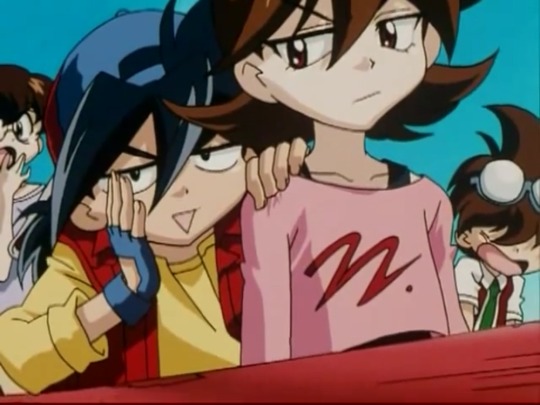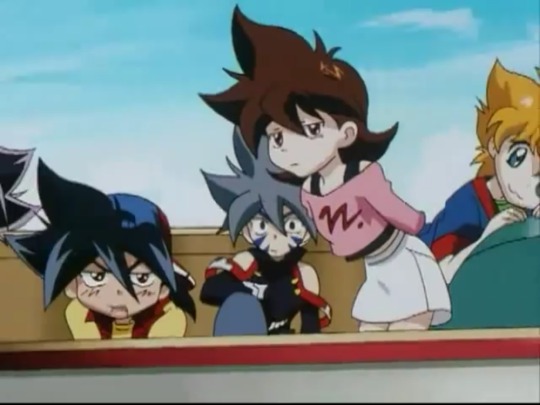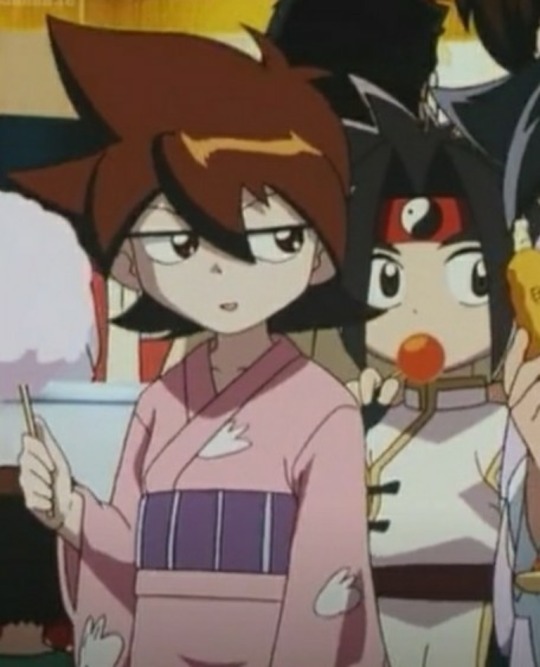#I feel like if the series retained the level of writing seen in s1
Explore tagged Tumblr posts
Text
(WOAH looks like I missed out a bit on the chitchat cuz my notifs glitched, but damn this thread has gotten longer)
Hiromi's role in the team was like that of an anchor, the one who would yell 'what the hell, hero?' when the situation called for it. She's strict, she's stern, but she's understanding, chill, silly and soft when she needs to me. She's not easily swayed, and is brave in the face of danger. She's undoubtedly a strong female character, but she also retains her femininity while doing so (if I am going to compare her with someone, it would be Katara from ALTA). In vforce, she was a person the team wouldn't be complete without. Similar to Kyoju, she was important to the team despite not outright stepping into the stadium and fighting a beybattle.
I get that grev tried to deal with darker, more psychological topics, but it could have been pulled off by not butchering every other character we had previously seen. And its not like there was a satisfactory conclusion to those 'darker topics' that made up for its flaws. Like yes grev has its moments, I wouldn't lie. There are times where it really makes you feel and its heading somewhere. Sometimes it does pull it off, but sometimes it doesn't. And what makes it more hard to sit with is the focus on circumstances rather than characters. Not says its a bad direction, but poor characterisation and execution ruins it.
I personally haven't really watched the dub, only bits. I did grew up with the local hindi dub that followed the eng dub, but I only remember bits and pieces from it. And when I rewatched the series I watched the jp dub since it had the uncut versions of the eps. And I do agree that the characterisation, especially in case of takao, feels like he went through a factory reset and pulled an ash ketchum on us. I think both versions are good, there are some things the dub did well compared to the sub and vice versa.
Season 1 was the perfect introduction, start and base for the entire franchise. It has almost zero flaws and amazingly executed arcs. I feel like the reason why vforce was rushed was due to production problems, like the change in animation studio, some episodes looking like they had less budget. Like esp towards the end you can see that the 'important' episodes are more well made than the others. Grev without a doubt wins in terms of visuals, and I think thats one of the reasons that saves grev. Grev had an interesting scenario and storyline, ngl. The newer addition of characters were also loveable. But, as we all know by this point, the execution was flawed. Instead of trying to be its own thing like vforce, grev wanted the s1 conflict back, but while doing so it lost its own integrity in the process, like the removal of the importance and presence of sacred beasts as well? The one thing that made beyblade more unique than just a spinning top anime? Hell its like even the sacred beasts were given the same butchering treatment as the rest😭. Like I get its to prevent the characters going "I AM HERE TO STEAL YOUR SACRED BEAST" all the time but like.....there were better ways to prevent that. This is also another thing that grev does to kinda ignore v force, whose entire buildup was focused on sacred beasts, where they come from, what they really are etc. Can you really blame vforce for feeling like a filler season?






V-force Hiromi thank you for being the icon ever, being chaotic and silly (esp that punch like yas gurl throw hands!! <3) like the others while being the mom friend of the group and doing an actual good job at consoling Takao/keeping him in line while being mature about his feelings too, being a therapist to Kai and many more moments. She's basically the emotional stability the gang lacked previously. And lets not forget the boat scene in the movie when Daichi was telling Hiromi about how his dad died and why he was hell bent on beating Takao, her response was that of understanding as she got where Daichi was coming from as a kid who was trying to fullfill his father's last wish, that was very sweet of her ngl (Takao's response to Daichi's revelation was sweet too, in his own way. I might make another post on that. Personally I prefer their dynamic in the movie than in G-revolution tbh. Also the idea if the team randomly adopting a tiny homeless redheaded gremlin is wayy funnier, like "oh, he's not gonna leave us be, and he doesnt have a home to go back to, guess he's staying with us now huh. Welcome to the gang bud" *daichi proceeds to latch onto them like a leech*)
#beyblade v force#bakuten shoot beyblade#beyblade g revolution#comet's rambles#I feel like if the series retained the level of writing seen in s1#it would've been an amazing trilogy
53 notes
·
View notes
Text
A Tale of Two P.I.s: How Stumptown Succeeded Where Veronica Mars Failed
A hardboiled female private eye with a drinking problem, a litany of temporary sexual partners, and trauma resulting from her romantic soulmate dying in an explosion that’s partially her fault solves mysteries.
This could describe either the freshman ABC show Stumptown, starring Cobie Smulders as military veteran Dex Parios, or Rob Thomas’s intended vision for an adult Veronica Mars in the wake of the recent S4 that aired on Hulu. Many VM fans turned to the former after the supreme disappointment that was S4 in order to get their kickass lady detective fix; a common refrain that I’ve seen is that Stumptown is the show that adult Veronica Mars should have been. Notably, Stumptown was recently renewed for a second season, while Hulu has declined to order more seasons of Veronica Mars. Now that the pain of VM S4 is less fresh, I recently watched the first season of Stumptown to see if it was worth the hype. Here are the reasons why I think that Stumptown has been renewed for a second season while Veronica Mars has, much like Susan Knight, been left dead in the water:
Dex is a competent detective
Like, I shouldn’t even have to say this, but: if you’re going to make a show about a private investigator, that character should be able to crack cases. Rather infamously, Veronica did not solve any mysteries in VM S4: Keith solved the bomber mystery, Logan solved the congressman blackmail mystery, and Vinnie solved the missing ring mystery. Veronica just kind of floated around being a mean party girl.
Meanwhile Dex, despite being less experienced as a detective, uses her smarts and background as a military interrogator to solve the mystery of the week. She notably utilizes disguises and undercover work, two former features of Veronica’s investigating that were missing in S4. The show also makes a decent attempt to portray the realities of her having to obtain a license to be a PI and work legally, including an internship and dealing with consumer complaints. Contrast this with the proposed future seasons of VM as a traveling detective--something that would be nigh impossible giving licensing requirements.
I think the contrast between the two’s abilities can best be seen in their opening scenes of the season: Dex, at the casino, is able to suss out a married dude hitting on her pretty quickly, comprehensively listing his tells. Meanwhile, Veronica’s first scene in S4 has her randomly smashing a client’s belongings to find hidden cameras and then unprofessionally overcharging her. If that’s how she treats clients, it’s no wonder that Mars Investigations is financially struggling at the beginning of S4.
Stumptown also does a better job than VM S4 of showing why the protagonist chooses to be a detective. For Dex, it gives her stability and a sense of purpose that had been lacking since her return from Afghanistan. On the other hand, Veronica is shown to be somewhat dissatisfied with her life in S4, but it’s never explicitly addressed why; it’s also not examined why she remains in Neptune as a detective when she could use her Ivy League law degree at any time and live anywhere, especially when she appears to no longer have a talent for being a detective. Logan briefly broaches the subject in one scene, but it’s dropped just like every other VM plot thread.
Dex is a marshmallow
As has been covered extensively elsewhere (including the pages of this very blog), probably the largest issue that people had with S4 of Veronica Mars outside of Logan’s death was Veronica’s characterization. Rob Thomas said in interviews that he told the writers this season to write Veronica like a porcupine; the end result was a portrayal that dialed all of Veronica’s negative traits to 11, added new ones, and completely removed the softer aspects of her character that made her such a compelling and complex protagonist. There was an attempt to give Veronica an emotional connection to the bomber mystery via the character Matty, but for most viewers it didn’t resonate due the flat affect of both actresses and poor writing. It was hard to feel like Matty was a sympathetic underdog when she had a wealthy mother ready to whisk her away to Paris for Spring Break. Veronica also doesn’t appear to have retained her former drive for justice; she mostly seems interested in collecting a paycheck (and if that’s the case I again ask why she isn’t using her Columbia law degree). She also weaponizes her white womanhood against a Latino teenager. What a great role model!
Contrast this with the also outwardly caustic Dex, who initially IS only in it for the paycheck. First off, even that’s somewhat noble in that she needs to take care of her adult brother with Down’s syndrome. Yet she quickly finds her sense of justice overcoming her desire to make bank. We see this early in the season when she turns against the PI she is shadowing in order to help a young mother obtain custody of her child from her wealthy, abusive ex-husband. This is also seen when she brokers a deal to protect the privacy of the biological child of a political candidate she’s been hired to find dirt on.
Dex also relies heavily on her support system--namely her brother Ansel, best friend Gray, food truck purveyor Tookie, and even police detective Hoffman. She resists her brother moving out because she’d be lonely without him, and her entire found family are instrumental in helping her with her cases. This isn’t necessarily different from Veronica per se, although Veronica treated her loved ones cruelly in S4. Additionally, Rob Thomas wanted to continue the show without them, despite how heavily Veronica relied on them both to help her with cases as well as emotionally.
Stumptown also shows that even if Dex hasn’t fully processed her trauma, she is capable of growing. She makes nice with her high school enemy after clearing her daughter of suspected drug dealing. Contrast this with Veronica, who punched her high school nemesis at her high school reunion (and for the five millionth time, no one wanted to see that) and was shown to have regressed as an adult to be more immature at age 35 than she was at 17. That didn’t make her seem more cool or noir, just sad.
Also, Dex actually manages to brush her hair. (But srsly I need to know how they get her hair to do that great wavy thing).
Dex’s trauma is thoughtfully addressed
As a corollary to the above point: there was obviously Something Wrong with Veronica in S4, but the show didn’t bother to explain what had transpired between the end of the second book and S4 to explain her seeming personality transplant; as a fellow fan has said, the show pretended to deal with her trauma but glossed over it in reality. For example, in addition to depicting her as being depressed and cruel to her loved ones, she is shown drinking heavily and doing drugs, both of which are out of character for her. Yet the show seems to glamorize it; none of her loved ones express any concern about this behavior and there are no references made to her alcoholic mother, whose actions negatively affected her growing up to the extent that Veronica had previously expressed wanting to avoid becoming like her. But despite the fact that she was obviously struggling with something, Rob Thomas and Kristen Bell stated that they needed to kill Logan because Veronica was somehow not traumatized enough. Apparently, putting Logan’s ring on her finger just magically erased her previous issues (unrealistic and harmful messaging to trauma survivors), and he needed to die because women can only be interesting if they’re damaged (misogynistic). Adding insult to injury was Rob Thomas’s assertion that Logan’s memory wouldn’t play much of a part of the show going forward because it would be too depressing and he needed Veronica to not be consumed with thoughts of him while engaging in “strange sex”, whatever that means. Yeah Rob, it would def be realistic for Veronica to just get over the fact that her husband and love of her life died of a bomb due to her oversight in a year and then continue on her merry way without any support from her loved ones!
Stumptown, however, explicitly connects Dex’s self destructive behavior with her past trauma: in the very first episode Dex is shown frantically texting contacts for a sexual hookup in the midst of a PTSD episode. The most powerful scene of the entire season in my opinion is one where, after experiencing a flashback to her time as an interrogator in Afghanistan, she goes on a bender at home and trashes her house to the soundtrack of Fleetwood Mac’s “The Chain.” (As an aside, I would also like to point out that Stumptown deftly portrays the trauma and grey morality associated with military service, which could have been an amazing (and noir!) storyline for naval intelligence officer Logan in future seasons of VM if Rob Thomas wasn’t such a dimwit).
Additionally, the death of her not quite-fiancé Benny hangs over her, even though the event took place twelve years prior to the start of the series. Even before Benny is introduced onscreen in flashbacks in the penultimate episode of S1, the show does a good job of portraying just how much he and their relationship meant to Dex. The season culminates in Dex finding out that his death in an explosion in Afghanistan was not in fact her fault, as she had previously assumed. Interestingly, the show’s writers considered revealing that Benny had faked his death, but the head writer later stated in an interview that doing so would invalidate the trauma Dex had experienced for 12 years and would ultimately be cruel. While on a shallow level I wouldn’t have minded them bringing Benny back since the actor who played him was super attractive and had great chemistry with Cobie Smulders, the decision the writers made instead makes more sense for the world they have built and is far more thoughtful: it allows Dex to obtain a sense of closure and growth while respecting her grief.
Women over the age of 35 aren’t Satan
A criticism of VM since it originally aired is that the show generally portrays female characters, especially mothers and other women over a certain age, in a negative light (and Rob Thomas has been defensive about it just as long). The books partially rectified this by introducing the characters of Petra Landros, the former model turned owner of the Neptune Grand, and Marcia Langdon, the new Balboa County sheriff with a murky past. Marcia was brought back for S4, but considerably dumbed down and less complex than in the books (and there’s definitely something to be said that the first time a BIPOC woman is shown in a position of power on screen in VM that her character is diminished).
Stumptown, on the other hand, has two women as older female mentors/nemeses in positions of power: Sue Lynn, the matriarch of the local Native American tribe, and Lieutenant Cosgrove of the Portland PD. Both have complicated relationships with Dex: Sue Lynn ended Dex’s relationship with Benny, her son, yet repeatedly seeks her out for help with matters on the reservation. Lieutenant Cosgrove often finds herself at odds with Dex while the latter is attempting to solve a case, though she also encourages her to legally obtain her PI license. It shouldn’t be revolutionary to have complex older female characters as supporting cast on a female-centered show in 2020, but after 15 years of misogyny from VM it certainly feels refreshing.
Where Stumptown falls short
All of this is not to say that Stumptown is flawless. Despite my praise for including older female characters above, the show is still pretty dude heavy, especially Dex’s inner circle. The mysteries of the week are of fairly average quality, and several were reminiscent of some seen in VM’s original run--the season even ends with a “Who’s at the door?” gambit. I also didn’t love the storyline where Grey’s girlfriend gets Dex drunk and tricks her into thinking they had slept together in order to drive Grey and Dex apart--that felt like something out of the mind of Rob Thomas. It also bears mentioning that in the context of current events the generally positive portrayal of the police department and Dex’s close relationship with them should bear more scrutiny. And while the show is well done overall, it never quite reaches the emotional resonance of original flavor VM (but then, neither did VM S4).
Despite those quibbles, I think it’s a good show overall. I felt like as the season progressed the creative team figured out what worked and the cast seemed to gel together. I love the classic rock soundtrack (another area where VM S4 failed, given that it abandoned VM’s signature indie soundtrack for generic pop music), which in conjunction with Dex’s wardrobe gives the show a fun retro feel. By the end of the season I was firmly won over, and I look forward to S2. Hopefully the writers of Stumptown paid attention to the backlash to VM S4 as a lesson in what not to do going forward.
#surprise bitch you thought you'd seen the last of me complaining about VM S4#well think again#also this turned out way longer than I thought it would#i deleted a whole section on the stylistic choices in Stumptown vs. VM#Veronica Mars Hulu revival#Stumptown#Veronica Mars
16 notes
·
View notes